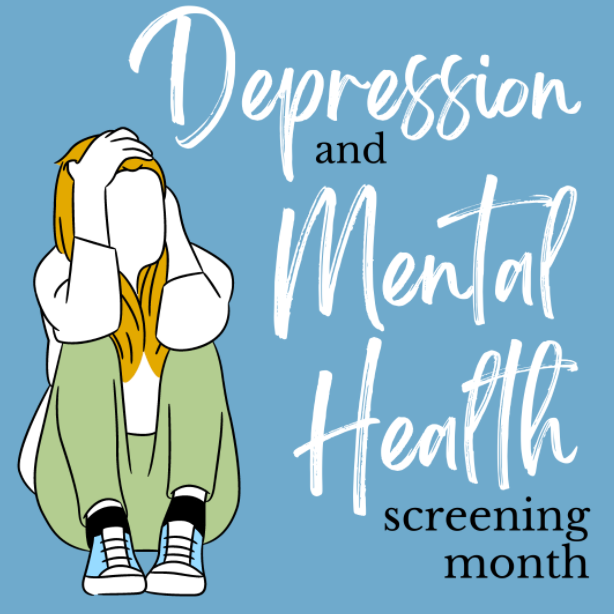Understanding your mental health during depression awareness month
To recognize National Depression Awareness Month, Claire Schuppel gives the facts about mental health and resources to help.
Oct 14, 2021
Sometimes one is overcome with a wave of impenetrable negative emotion that cannot adequately be put into words. Often, this can be greater than just feeling sad, nervous or overwhelmed. When one might say they are feeling “depressed,” that can be an indication of a larger issue. October’s National Depression Awareness Month (and the concurrent Mental Health Screening Month) helps shed a necessary light on this widespread issue.
The label of “depression” has an intimidating connotation, like most other mental illnesses. Thankfully, medical professionals and psychologists have created a strong inventory of experiences or symptoms to help aid a typical depressive disorder diagnosis. The Mayo Clinic outlines depression in detail on their website, but some symptoms of the disorder include prolonged feelings of sadness or emptiness, lost interest in previously pleasurable activities, unorganized sleep, appetite changes, feelings of worthlessness, suicidal thoughts and physiological issues.
Depression is hard to understand, even after seeing the symptoms presented before you. The issue can seem straightforward at the surface, but it can be a challenge to assign words to how people with depression feel every day. The World Health Organization put out an important video and resource that can help readers understand the looming effect of depression with their video titled “I had a black dog, his name was depression.” It encapsulates the feelings associated with depression in an eloquent and respectful manner, shining light on the fact that things can get better. While you might not ever be able to eradicate depression from your life, you can use it as a tool to reflect upon treatment progress.
Online resources that lay out symptoms of mental illnesses can be valuable to the public, especially since counseling can be an expensive option. While being able to assess information yourself at home is important, it is not the method of diagnosis. The latter half of the month of October, or Mental Health Screening Month, puts emphasis on the need for affordable and accessible screening options. Psychology professor Dr. Sheri Young stressed the importance of early screenings, saying, “Early screening for mental health disorders, including depression, provides an opportunity for early detection and treatment. The earlier the detection, the greater the likelihood for a successful short-term and long-term recovery.”
More options are available than one would expect in this area. John Carroll students are fortunate enough to have a mental health resource on campus, as the Counseling Center provides opportunities for counseling and strong outside referrals. If you are in search of outside resources, you can contact your family doctor or physician for referrals or input on a potential diagnosis.
For too long, society did not acknowledge the struggles of those who struggle with mental health disorders, especially with depression, so these national acknowledgments matter more than ever. While some might be more educated on the topic of depression, such as Kristin Wojtowicz ‘23 who told the Carroll News, “Being a psychology major allows me to be more aware and cautious of those around me struggling with depression,” not everyone has had the opportunity to learn about the mental illness. Creating months centered around awareness of different mental illnesses can bring necessary information to the public. The goal after October is for more of our society to be able to identify symptoms of depression in different situations.
If you, a friend or a loved one has expressed feelings of depression, anxiety or other mental illnesses, there are fast resources that can be useful.
- The National Suicide Prevention Line’s 24/7 Hotline:1-800-273-8255.
- JCU Counseling Center: 216-397-4283 or counselingcenter@jcu.edu
- Crisis Text Hotline: text HOME to 741741
- If an emergency occurs: call 911 or the JCU PD at 216-397-1234














